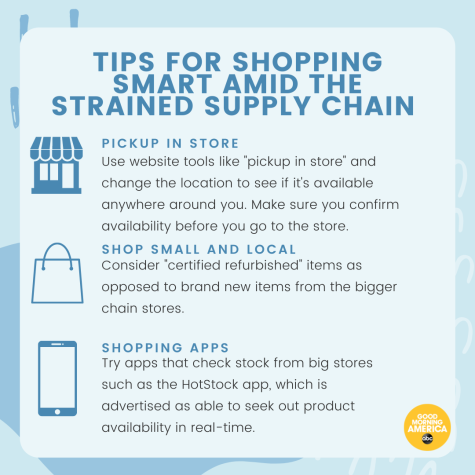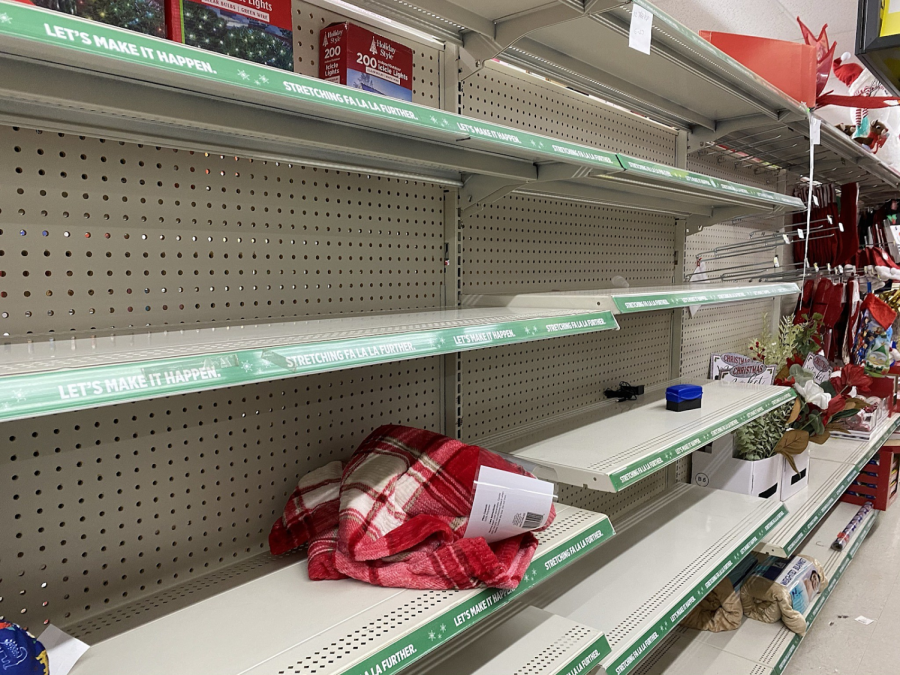Supply chain chaos
Shelves are empty at a Dollar General in Cedar Valley, Iowa. This Christmas season, shoppers are experiencing shipping delays and increased prices. Photo courtesy of Shawn McKenna
December 17, 2021
In March 2020, America went into lockdown in the wake of the coronavirus pandemic, prompting a disruption in the supply chain.
Almost two years later, Americans are witnessing higher prices and unavailability in stores across the country.
In October 2021, the U.S. Bureau of Labor Statistics reported that prices in America increased 6.2% in the past 12 months, or since October 2020.
The report displays the largest 12-month increase since November 1990, when the Consumer Price Index (CPI) was 6.3%.
With Christmas around the corner, major retailers are struggling to keep up with the demand of shoppers.
Supply shortages in America affect many types of goods, ranging from microchips to lumber, which is a result of numerous challenges facing the economy.
Factory shutdowns
Since the beginning of the pandemic, factories around the world have shut down due to the transmission of COVID-19 and strict safety regulations.
According to the Office of the United States Trade Representative, China was America’s largest goods trading partner in 2020.
When factories and ports closed in China due to COVID-19, it created an imbalance between supply and demand in America.
With the discovery of new coronavirus variants, such as the Omicron variant, the supply chain is at a standstill.
Shipping containers
Due to supply chain challenges and rising overseas shipping costs, the prices of shipping containers are also increasing.
According to award-winning business journalist Janet Porter, the cost of a 40-foot shipping container increased from $2,800 in 2019 to $6,400 in 2021.
Although companies are spending more money to transport goods, it is taking more time for the goods to arrive.
Shipping ports
Throughout the shipping crisis, American ports have struggled to keep up with the arrivals and departures of ships.
Additionally, dockworkers infected with coronavirus had to quarantine, resulting in a lack of workers.
As a result, many ships arriving in American ports from coast to coast had to anchor themselves for several days before they could load and unload.
On October 13, 2021, President Biden announced that the Port of Los Angeles, America’s largest port, would operate 24 hours a day, 7 days a week.
As of early December 2021, Biden’s plan has not gone into effect due to scheduling issues.
Port of Los Angeles Executive Director Gene Seroka said, “It’s an effort to try to get this entire orchestra of supply chain players to get on the same calendar.
We’ve had very few takers to date.”
Planning for Christmas

Although the supply chain issues are ongoing, Americans have to consider their Christmas shopping options.
Availability and price are the determining factors of finding Christmas gifts this year.
With the reopening of US borders to non-essential travel on November 8, El Paso, Texas, saw an increase in shoppers.
Amid the supply chain crisis, El Paso businesses look to keep up with the influx of shoppers this holiday season.
In an interview with KFOX14, University of Texas at El Paso (UTEP) professor Dr. Tom Fullerton said, “We may see those retail shortages develop more quickly because not only will there be
the holiday shopping from this side of the border, we’ve got the holiday shoppers from the southside of the border, and we’ve got the pent up demand that has built up over the course of the past 19 months.”
Nobody could have foreseen a global pandemic or the effects it would inflict on the supply chain.
How America’s supply chain situation evolves will determine what Christmas shopping will look like in the years to come.





